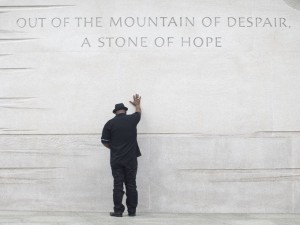Perseverance: steadfastness in doing something despite difficulty or delay in achieving success.
 I woke up this morning thinking about the anniversary of the march from Selma to Montgomery that took place fifty years ago today. As I imagined what it must have been like to be there that day, and I contemplated once more the actions in states like North Carolina to systematically weaken the Voting Rights Act, the word for today came to mind: perseverance.
I woke up this morning thinking about the anniversary of the march from Selma to Montgomery that took place fifty years ago today. As I imagined what it must have been like to be there that day, and I contemplated once more the actions in states like North Carolina to systematically weaken the Voting Rights Act, the word for today came to mind: perseverance.
I watched an episode of Eyes on the Prize called “Bridge to Freedom” that recounted the lead up to the march and the aftermath. The film footage is unnerving, even frightening to think it took place in America in my lifetime. That the people kept coming back, and stayed committed to the principle of nonviolence, demonstrated their perseverance, their steadfastness.
I went back to find the transcript of Dr. King’s speech at the conclusion of the march. His understanding of how racism and segregation created both a race and a class struggle in our country is insightful and painful. Reading them from the perspective of our time, where economic disparity grows greater and greater, we need to hear them again.
If it may be said of the slavery era that the white man took the world and gave the Negro Jesus, then it may be said of the Reconstruction era that the southern aristocracy took the world and gave the poor white man Jim Crow. He gave him Jim Crow. And when his wrinkled stomach cried out for the food that his empty pockets could not provide, he ate Jim Crow, a psychological bird that told him that no matter how bad off he was, at least he was a white man, better than the black man. And he ate Jim Crow. And when his undernourished children cried out for the necessities that his low wages could not provide, he showed them the Jim Crow signs on the buses and in the stores, on the streets and in the public buildings. And his children, too, learned to feed upon Jim Crow, their last outpost of psychological oblivion.
Thus, the threat of the free exercise of the ballot by the Negro and the white masses alike resulted in the establishment of a segregated society. They segregated southern money from the poor whites; they segregated southern mores from the rich whites; they segregated southern churches from Christianity; they segregated southern minds from honest thinking; and they segregated the Negro from everything. That’s what happened when the Negro and white masses of the South threatened to unite and build a great society: a society of justice where none would pray upon the weakness of others; a society of plenty where greed and poverty would be done away; a society of brotherhood where every man would respect the dignity and worth of human personality.
In his speech from the bridge in Selma today, President Obama said:
The Americans who crossed this bridge were not physically imposing. But they gave courage to millions. They held no elected office. But they led a nation. They marched as Americans who had endured hundreds of years of brutal violence, and countless daily indignities – but they didn’t seek special treatment, just the equal treatment promised to them almost a century before.
What they did here will reverberate through the ages. Not because the change they won was preordained; not because their victory was complete; but because they proved that nonviolent change is possible; that love and hope can conquer hate.
As we commemorate their achievement, we are well-served to remember that at the time of the marches, many in power condemned rather than praised them. Back then, they were called Communists, half-breeds, outside agitators, sexual and moral degenerates, and worse – everything but the name their parents gave them. Their faith was questioned. Their lives were threatened. Their patriotism was challenged.
And yet, what could be more American than what happened in this place?What could more profoundly vindicate the idea of America than plain and humble people – the unsung, the downtrodden, the dreamers not of high station, not born to wealth or privilege, not of one religious tradition but many – coming together to shape their country’s course?
What greater expression of faith in the American experiment than this; what greater form of patriotism is there; than the belief that America is not yet finished, that we are strong enough to be self-critical, that each successive generation can look upon our imperfections and decide that it is in our power to remake this nation to more closely align with our highest ideals?
Rep. John Lewis, who marched with King and the others, introduced President Obama. One hundred members of Congress were in Selma today. One of them—ONE of them—was a member of the Republican leadership. The mostly rich white men who hold elected office in our legislature are fooling themselves if they think the adolescent partisan bickering that takes up most of their time passes for leadership or actually doing their job. The patchwork quilt of talent and ability, of heritage and history that truly makes up our nation looks nothing like the class picture of Congress.
Those of us who are people of privilege must persevere to do whatever we can to understand what it feels like to live without all the things we take for granted. bell hooks says it this way:
Of course, it remains the responsibility of white citizens of this nation to work at unlearning and challenging the patterns fo racist thought and behavior that are still a norm in our society. However, if whites and blacks alike do not remain mindful of the continual heed to contest racial segregation and to work towards a racially integrated society free of white supremacy, then we will never live in beloved community.
That beloved community for which we persevere is a big tent. We have to learn how to listen about race and class and sexual orientation and gender identification and immigration status and whatever else divides us. Listen. Listen. And then listen some more. Then let us look for commonalties, for ways to voice our shared humanity, rather than beating each other with clubs of doctrine or fear. We cannot wait for it to come from the top down. There’s too much money up there. We cannot be discouraged by those who keep throwing legal obstacles in our way. As Dr. King said,
I come to say to you this afternoon, however difficult the moment, however frustrating the hour, it will not be long, because “truth crushed to earth will rise again.”
How long? Not long, because “no lie can live forever.”
How long? Not long, because “you shall reap what you sow.”
How long? Not long:
Truth forever on the scaffold,
Wrong forever on the throne,
Yet that scaffold sways the future,
And, behind the dim unknown,
Standeth God within the shadow,
Keeping watch above his own.
How long? Not long, because the arc of the moral universe is long, but it bends toward justice.
Perseverance—or, as we say here on Moral Mondays, forward together, not one step back.
Peace
Milton

“What could be more American than what happened in this place?” Wonderful.
One Republican?
Great post! I have been deeply stirred by theses days of remembrance and also inspired by the talent and intelligence of President Obama.